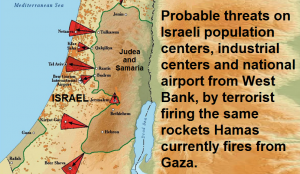
With Hamas’ surprised announcement a fortnight ago to participate in West Bank elections, bringing in the same political/ideological policies as Gaza, Israel scrambles to prop up Abbas and the Palestinian Authority.
By Alex Fishman
While Israel’s leadership is busy exhausting itself arguing over Hamas’s tunnel digging in Gaza in 2014, they are missing—or perhaps ignoring—a major threat the terror organization is preparing in the West Bank. This political threat, which very well might pose obstacles to Israel’s operations in the West Bank, can’t be destroyed using technological measures.
Hamas is about to take over the municipal centers of power in the West Bank in a legal and democratic way in several weeks time as part of its plan to take over the entire Palestinian Authority—but we, as we always do, may have missed the train yet again.
It started just like any other minor event the neighbors were holding. When Palestinian President Mahmoud Abbas announced that municipal electionswould take place on October 8, Hamas said it wouldn’t participate—and Israel lost interest.
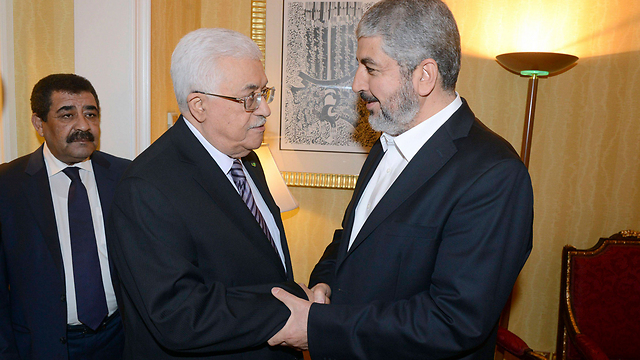
Abbas meets with Mashal in Doha – Photo: Reuters/Archive
The Palestinian leader was sure he was going to recreate his success in the2012 local elections, when Hamas expressed its distrust of the PA and decided not to take part. Abbas’s representatives defeated themselves that year, and even that was a hard-won battle due to the PA’s distinct lack of popularity.
However, Hamas lulled everyone into a false sense of security and then, all of a sudden, dropped a bombshell two weeks ago when the terror group announced it would participate in the elections, setting the entire West Bank aflame. The entire situation changed at once.
And it’s not just Hamas. The left wing factions in the Palestine Liberation Organization (PLO), and even Islamic Jihad—which has never participated in any elections—announced that they will run too.
No analysts or commentators predicted this. Everyone—both on the Israeli and Palestinian side—fell out of their seats, while the PA went into shock.
These elections are no longer just a vote over sanitary conditions in the Palestinian cities, but rather a process with national and political significance that threatens to unseat Fatah from the centers of power in the West Bank.
Some 2.6 million eligible Palestinian voters will go to the polls in 416 local authorities in Gaza and the West Bank—141 of them considered cities or large towns, and 13 are major cities. Even in the most optimistic predictions in the PA, no one has any doubt that Hamas is about to sweep many areas and large cities.
The Palestinian electoral registry in the West Bank and the Gaza Strip was completed a little over a month ago, which was probably the moment Hamas decided to throw its hat into the ring. By mid-August, the organization will have revealed its candidates. It will likely present its candidates as “independents,” to stop Israel and the PA from banning them over the fact they are affiliated with Hamas. Hamas might also try to establish coalitions with left-wing organizations and others to oust Fatah candidates in areas where Abbas’s party holds more sway.
70 activists arrested
Hamas’s surprising move came as Defense Minister Avigdor Lieberman was in the midst of intensive discussions with the IDF chief of staff, his deputy, the head of Military Intelligence, the Coordinator of Government Activities in the Territories (COGAT), the GOC Central Command and representatives from the Shin Bet over Israel’s policy in the West Bank. He recently completed the discussions on the issue and last week presented a series of measures he intends to take.
It’s unclear how involved the prime minister was in the process and whether he supports the decisions made. In a meeting with military reporters, Netanyahu dubbed Lieberman’s ideas as “more original than those of his predecessor.” However, Lieberman will be judged, as prime minister says, based on results.
Among the measures discussed by the defense minister was the construction of another Palestinian city like Rawabi—the first planned city built for and by Palestinians—in an effort to strengthen the Palestinian middle class in the PA and boost the local economy.
Another recommendation discussed was to legalize illegal houses in Area C (which is under Israeli control), where some 200,000 Palestinians live. These houses “spilled over” from urban and rural areas in Areas A and B into Area C and take up one percent of the West Bank area. In order to avoid political bickering in the government over the legalization of these structures, the area will continue to be under full Israeli sovereignty, but the Palestinian Authority will be in charge of granting construction permits. This will lift the threat of demolition of the homes of hundreds of thousands of Palestinians in the West Bank.
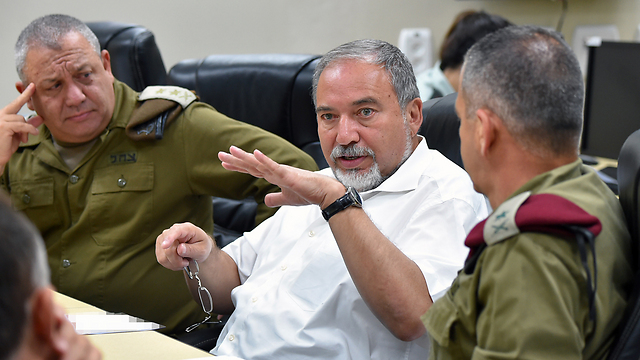
Defense Minister Lieberman, center, meets with IDF Chief of Staff Eisenkot (L) and other senior officials at the Northern Command headquarters – Photo: Ariel Hermoni, Defense Ministry
Yet another idea concerns Jewish construction in the territories. Here, too, to avoid political obstacles, construction will be allowed within the settlements, but not outside their security fences.
Lieberman defines his measures as a “carrots and sticks” plan. Officials who participated in the discussions over the measures stated that the defense minister displayed a very pragmatic—surprising, even—approach to the “carrots,” the measures meant to strengthen the Palestinian civilian sector—those not affiliated with or participating in terror activity. The “sticks,” meanwhile, include broad collective punishments, with economic and security measures to be taken in areas where terrorism prospers.
Some of the measures examined by the defense minister were recommended by COGAT two years ago. At the time, there was a general feeling in Israel that the gestures made towards the Palestinians over the years have been exhausted, and a proposal was put together for a series of economic and political measures that have since been partially or tentatively implemented—if at all.
During an event marking the Egyptian Revolution Day at the home of Cairo’s ambassador to Israel a few weeks ago, Prime Minister Benjamin Netanyahu, Egyptian Ambassador Hazem Khairat and Netanyahu’s close confidant Yitzhak Molcho had a conversation behind closed doors that lasted nearly an hour. The Egyptian envoy was trying to find out the extent of Israel’s commitment to the peace initiative led by President al-Sisi. The questions he put to the prime minister—likely with the utmost of politeness—was what measures Israel was planning to take to bring the Palestinians to the negotiations table. The “carrots” part of Lieberman’s plan could definitely meet Cairo’s basic demands.
The defense minister believes the conflict with the Palestinians can only be resolved as part of a regional initiative. The Palestinian Authority, in his opinion, is not strong enough to constitute a true partner for peace negotiations, and that is why it needs the support of Arab states. In Lieberman’s view, Egypt is a strategic partner for Israel. Cooperating with Cairo and with the Arab League could, he believes, lead within a year to a significant drop in security tensions with the Palestinians or, at the very least, to an interim agreement that Israel could live with.
Even Lieberman’s close confidants understand that a diplomatic plan including a handful of tactical measures meant to stall for time—is a waste of time.
It appears the defense minister has a problem vis-à-vis the Egyptians, as the prime minister had taken over the diplomatic and political dialogue with them using Molcho, while partially neutralizing some of the channels between the Defense Ministry and Cairo. Defense officials believe this is a temporary situation, as the true key to launching meaningful talks with Egypt over a regional agreement is the defense minister and the military. After all, it is the defense establishment that presides over the main channel of communications with the Palestinians.
A considerable amount of time in the discussions over Israel’s West Bank policy was dedicated to the day after Mahmoud Abbas. If it were up to Lieberman, that day would come sooner rather than later. The defense establishment believes that Israel could and should influence the selection of the PA leader’s successors, so it could, in the future, have a dialogue with them.
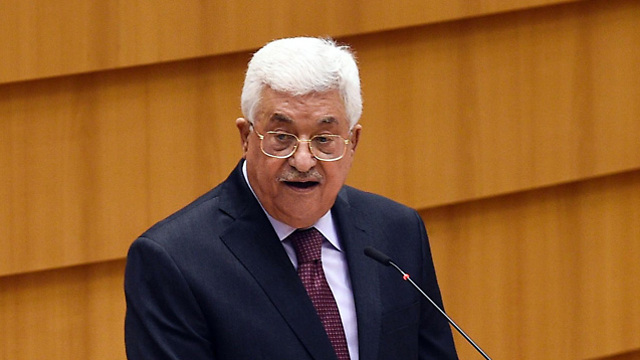
Palestinian Authority leader Mahmoud Abbas – Photo: AFP
But now that Hamas has put a spoke in Israel’s wheel by announcing it would participate in the elections, Lieberman’s plan became, without him having meant it, a plan to thwart Hamas’s efforts to take over the PA. There’s only one difference: Israel’s interest is now not only for Abbas to remain in his position, but also to strengthen him in that position using the “carrots,” so he could stop Hamas from taking over the PA.The moment Hamas threw its hat into the ring, Israel was supposed to wake up and ask itself whether it should join forces with the PA in an effort to sabotage the elections and thwart the terror organization. The defense minister has recently asked for a special meeting with the IDF to discuss the ramifications of the elections and what should be Israel’s policy on the matter.
The Palestinian Authority, meanwhile, has already started taking action. The Palestinian security forces recently arrested 70 high-ranking Hamas political figures, and it’s safe to say that this was only the beginning. However, arresting the terror organization’s representatives doesn’t necessarily guarantee Hamas would be stopped in its quest for power. Earlier this year, the PA tried to stop the Islamic bloc from winning in student council elections at Birzeit University by arresting many of its political figures, but to no avail.Hamas, on its part, is careful not to give Israel any reason to interfere: It is careful not to provide the IDF with cause to escalate the situation on the Gaza border and avoids mentioning the possibility of elections in Jerusalem’s Arab neighborhoods.
In tandem with Hamas’s announcement that it would participate in the municipal process, the head of its political bureau, Khaled Mashal, was quoted in Arab media as saying there was no reason not to have negotiations with the enemy (Israel)—under certain political circumstances. This is an unprecedented statement meant for Israeli and Western ears, to assuage concerns over a Hamas victory in the local elections.
Furthermore, Mashal was also quoted as saying he views the revival of ties between Israel and Turkey as an opportunity that could accelerate the possibility of negotiations to achieve real peace.
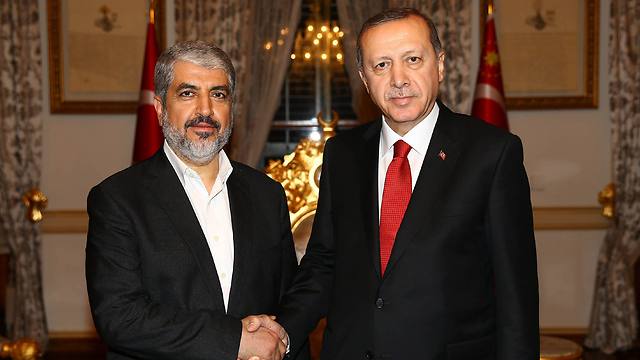
Hamas political leader Khaled Mashal meets with Turkish President Recep Tayyip Erdogan – Photo: EPA
Hamas was quick to deny these reported comments from Mashal, but his words were nevertheless well received in the region and helped prepare public opinion to the organization’s participation in the elections.Israel is not buying these hidden messages. The municipal elections held in the West Bank and in the Gaza Strip in 2004-2005 ended with Hamas coming out on top and served as a preview for the general elections in 2006, when the terror organization was also victorious. At the time, a national Palestinian government headed by Hamas was established and lasted for about six months, until the terror group brutally kicked Fatah out of the Strip, leading Abbas to dismantle the government and cut ties with Hamas.
Now, Israeli officials believe that an achievement by Hamas in the municipal elections will not only make a “lame duck” out of Abbas, but also lead the Gaza rulers, like in 2005, to demand general and presidential elections, following which it will work to achieve its greatest dream: Taking over the PLO.
General and presidential elections could bring to naught all of Israel’s “day after” plans for Abbas’s successors, reaching a regional agreement and making interim measures—as Hamas will be the one ruling in the West Bank. The policy of treating Gaza and the West Bank as two separate political entities, which has been the basis for Israel’s official policy vis-à-vis the Palestinians since the Hamas takeover in 2007—will be no more. Hamas will be the sovereign in both Gaza and the West Bank.
Firing up the Palestinian public
The municipal elections in the territories are usually done gradually, each time in a different area, so moods and trends can be discerned before the voting is done. The last time all cities went to the polls on the same day was in 1976. It appears that this precedent will now repeat itself in the coming elections. There will be no option to course-correct. Any arbitrary postponement of the elections could fire up the Palestinian public. The international community will not quietly accept such undermining of the democratic process in the West Bank, either.
Political analysts in Israel are predicting a victory for Hamas in the city of Hebron, in the nearby towns and villages, and in southern Mount Hebron area—a dedicated Hamas stronghold that hasn’t gone to the polls in 40 years. The terror organization is also expected to win in Jenin and in Nablus, where Adly Yaish, who is affiliated with Hamas and has already served as the mayor of Nablus, is expected to run again. Hamas is also likely to claim victory in Qalqilya, where Wajih Kawas, a known Hamas politician who spent time in Israeli prison, will run. The results in Tulkarm remain uncertain, but many other bad surprises are expected as the Palestinian Authority pays the price of 20 years of corruption and neglect.
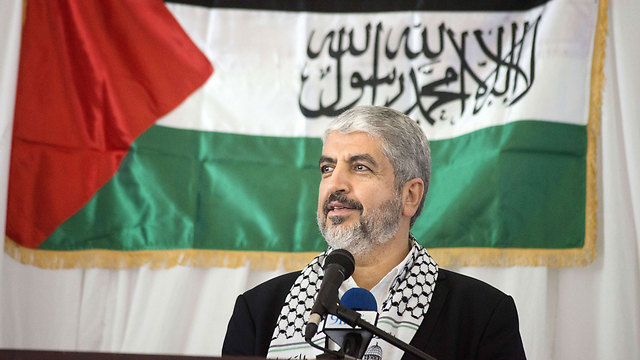
Hamas political leader Khaled Mashal – Photo: AFP
In an effort to reduce the number of cities that would fall into Hamas’s hands, Abbas issued a presidential decree that calls for Christian mayors to be elected in 11 municipalities. He is already butting heads with Hamas over this decision. It appears as if the PA is looking for any excuse to cancel the elections. Meanwhile, in election events organized by Hamas, the terror organization makes no secret of the fact it plans—as part of its campaign—to fire up the Palestinian public.If Hamas does indeed take over the majority of the major cities in the West Bank, how exactly could Israel have talks with municipality leaders affiliated with an organization it does not talk to? And what is Israel going to do if the mayor of Qalqilya, on the border of Kfar Saba, decides to arm his inspectors with guns, or establish a local armed police? Will the IDF set out to disarm the Qalqilya police?
These are just some of the easy questions, but even those don’t have an answer yet, as the cabinet is still fixated on those tunnels.
View original Ynet publication at:
http://www.ynetnews.com/articles/0,7340,L-4844196,00.html






 Israeli New Shekel Exchange Rate
Israeli New Shekel Exchange Rate